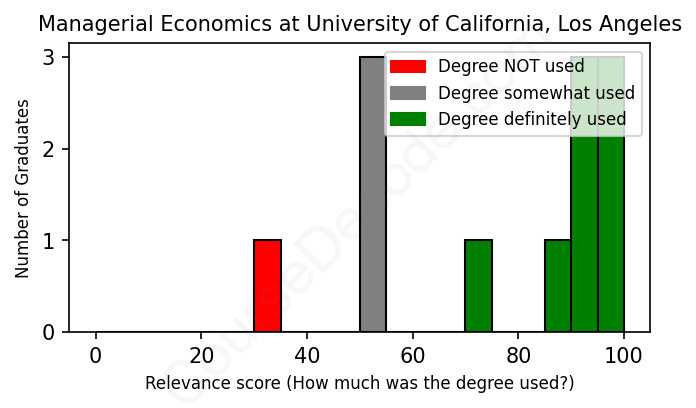
First, some facts. Of the Managerial Economics graduates from University of California, Los Angeles we've analyzed , here's how many have used (or NOT used) their degree in their career:

These are estimates based on AI analysis of 12 LinkedIn profiles (see below).
The verdict? Above average. Overall, with an average relevance score of 76%, Managerial Economics graduates from University of California, Los Angeles have a higher likelihood (+9%) of finding work in this field compared to the average graduate across all fields:
And for comparison, here's the chart for all profiles we've looked at across all degrees.
Also, after graduating, 41% of these graduates have pursued further education other than another Bachelor's degree (such as a Masters degree or other), compared to the average across all profiles of 35%. This suggests you may need more than just a Bachelors degree to be competitive as a Managerial Economics graduate.
See the details:
|
Relevance score: 90% We think this person has gone into a career highly relevant to their degree. We think this person has gone into a career highly relevant to their degree.
DEGREE INFOGraduated in 2022 from University of California, Los Angeles with a Bachelor of Arts - BA in Managerial Economics. No other secondary education since. JOB HISTORY SINCE GRADUATIONAudit Intern Hurewitz And Company Aug 2022 - Dec 2022 Staff Accountant  Wasserman Feb 2023 - Present ABOUTNo information provided. |
The top 10 most common jobs done by the graduates we've analyzed (ranked most common to least) are:
It looks like many folks who studied Managerial Economics at UCLA have gravitated toward roles in finance, auditing, and managerial positions, particularly within big firms like KPMG and PwC. For instance, a lot of graduates ended up as Audit Senior Associates or Managers, where they apply principles of managerial economics to analyze financial data and make informed business decisions. These roles, especially in auditing and tax, connect closely with the skills gained during their degree, like economic forecasting and strategic analysis, which are crucial for understanding financial health and guiding corporate strategy. Additionally, several graduates have ventured into legal areas, where understanding economics can significantly impact legal and financial outcomes.
However, not all the jobs directly relate to what they studied. For example, roles like Sales Executive or English Drama Teacher offer little connection to core managerial economics concepts, focusing more on sales techniques or education skills. Even some financial positions, such as staff accountants and tax associates, while somewhat relevant, may not fully leverage the broader economic theories and strategies emphasized in their education. Overall, while a significant portion of these jobs is related to managerial economics, many graduates find themselves in positions where they don’t utilize all aspects of their degree in their day-to-day work.
Here is a visual representation of the most common words in job titles for Managerial Economics graduates (this is across all Managerial Economics graduates we've analyzed, not just those who went to University of California, Los Angeles):

When you look at the career trajectories of UCLA graduates with a degree in Managerial Economics, it seems like many of them end up in pretty solid positions, especially early on in their careers. For instance, those that graduated in 2012 started off as Audit Senior Associates at big firms like KPMG, which is a respected role in the financial and consulting sectors. Similar patterns can be seen for those who graduated in 2016 and 2018, where they landed roles as Tax Associates, Sales Executives, and a variety of other positions that are pretty relevant to their studies. Overall, it looks like a good number of graduates are stepping into roles that leverage their economics background, particularly in finance and accounting.
Fast forward a few years, and you can see a mix of progression and diversification. Many graduates land managerial positions within the same firms they started at or transition into specialized roles, like Legal Associates or Accounting Directors. However, not everyone seems to stay directly in economic-related fields; some graduates took creative paths, like teaching or even starting their own crypto businesses. While that shows there's a bit of diversity in career choices, the majority still seem to stick to professional paths that align with their education. So, while there are a few outliers, the general trend indicates that a degree in Managerial Economics from UCLA does set you up for successful career prospects, especially if you're open to various opportunities in the finance and business sectors.
Getting a Bachelor's degree in Managerial Economics at UCLA can be pretty challenging, but it’s not the toughest degree out there. You’ll be diving into topics like economic theory, statistics, and business analysis, which can get pretty intense, especially if you're not super into math or economics. Overall, the workload can be rigorous, with a mix of lectures, group projects, and exams that require critical thinking. So, while it’s definitely not a walk in the park, if you stay organized, keep up with your studies, and genuinely engage with the material, you can definitely manage it and do well! Just be ready to put in some solid effort.
Most commonly, in the LinkedIn profiles we've looked at, it takes people 4 years to finish a Bachelor degree in Managerial Economics.
Looking at the career paths of these UCLA grads, it seems like most of them are doing pretty well in terms of making decent money, especially those who started in high-paying fields like accounting, tax, and consulting. For instance, the grad from 2012 climbed the ladder at KPMG all the way to a Director position, which usually comes with a hefty paycheck. Meanwhile, graduates in the more creative or educational fields might not be raking in as much cash. The ones working in finance or legal roles tend to see better salaries right off the bat, and even the newer grads starting out seem to be landing solid entry-level jobs that could lead to good pay in the future. So yeah, overall, it looks like these folks have a pretty bright financial outlook ahead!
Here is a visual representation of the most common words seen in the "about" section of LinkedIn profiles who have a Bachelor degree in Managerial Economics (this is across all Managerial Economics graduates we've analyzed, not just those who went to University of California, Los Angeles). This may or may not be useful:

Here are all colleges offering a Bachelor degree in Managerial Economics (ordered by the average relevance score of their Managerial Economics graduates, best to worst) where we have analyzed at least 10 of their graduates:
| College | Score | Count |
|---|---|---|
 University of California, Los Angeles University of California, Los Angeles
|
76 | 12 |
 University of California, Riverside University of California, Riverside
|
68 | 14 |
 University of California, Davis University of California, Davis
|
66 | 44 |
 State University of New York College at Cortland State University of New York College at Cortland
|
61 | 11 |
 UC Irvine UC Irvine
|
55 | 27 |